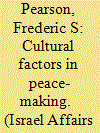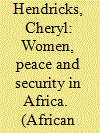| Srl | Item |
| 1 |
ID:
178537


|
|
|
|
|
| Summary/Abstract |
2019 marked the 25th anniversary of normalizing Jordanian-Israeli relations and the ‘warm’ peace-making between the two countries. Representing key partners and neighbours in the Middle East, Jordan and Israel have maintained political and economic ties since 1994. The pro-Western stance of both countries, and their common interest in maintaining regional stability, led Jordan and Israel to pursue similar foreign policy aims regarding various regional upheavals, as well as the Palestine-Israeli dispute. Jordanian-Israeli relations have, however, been caught amidst shifts in the US’s Middle East Policy under the Trump administration, which has raised questions over the status of Jerusalem and the West Bank. With respect to these developments, this article argues that the disaccord between the US/Israel and Jordan over these two places reveals that a politics of identity remains a pillar of the Kingdom’s stability and survival. Although both countries are being confronted with the same regional challenges, particularly in the wake of the war in Syria, the re-emergence of the rhetoric of ‘Jordan is Palestine’ – which poses the country as an alternative homeland for Palestinians (al-watan al-badil) – nowadays constitutes the top security concern for the Hashemite monarchy, and has the potential to undermine Jordanian-Israeli relations going forward.
|
|
|
|
|
|
|
|
|
|
|
|
|
|
|
|
| 2 |
ID:
153235


|
|
|
|
|
| Summary/Abstract |
The importance of culture, while recognized, has received proportionately less attention than political and economic issues and objective interests in settling political disputes. Traditional ways of understanding conflict and approaches to reconciliation nevertheless appear to play a major role in the frequent breakdown of peace agreements, as parties’ underlying needs and expectations are not met. A review of data on peace agreements in the Middle East as compared to the rest of the world shows that power imbalance, perceptions of injustice and the authority of potential mediators play especially important roles in success. In cases of inter-Arab and Arab–Israeli conflict, reconciliation requires power rebalance, demonstrated mutual respect and security guarantees.
|
|
|
|
|
|
|
|
|
|
|
|
|
|
|
|
| 3 |
ID:
153232


|
|
|
|
|
| Summary/Abstract |
This introductory article describes peace-making, peace-building and peace-keeping according to the specific characterization of the Israeli–Palestinian conflict. It presents the different articles in this special issue according to these categories and discusses critically their main theses. This methodology intends to help us gain a better understanding of the challenge of change.
|
|
|
|
|
|
|
|
|
|
|
|
|
|
|
|
| 4 |
ID:
142052


|
|
|
|
|
| Summary/Abstract |
This article highlights and critiques the underlying conceptualisations and assumptions of the women, peace and security (WPS) agenda that emerged with the adoption of United Nations Security Council Resolution 1325 in 2000. The main argument is that we need to rethink the WPS agenda to produce more holistic and groundbreaking responses for the types of challenges encountered, i.e., that gender inequality and insecurity are deep rooted and multi-layered, and thus negate mechanistic responses that do not deal with cultural and structural issues. It specifically focuses on gender and peace-making and gender and peacekeeping to point to the pitfalls in the current conceptions and practices in this arena.
|
|
|
|
|
|
|
|
|
|
|
|
|
|
|
|